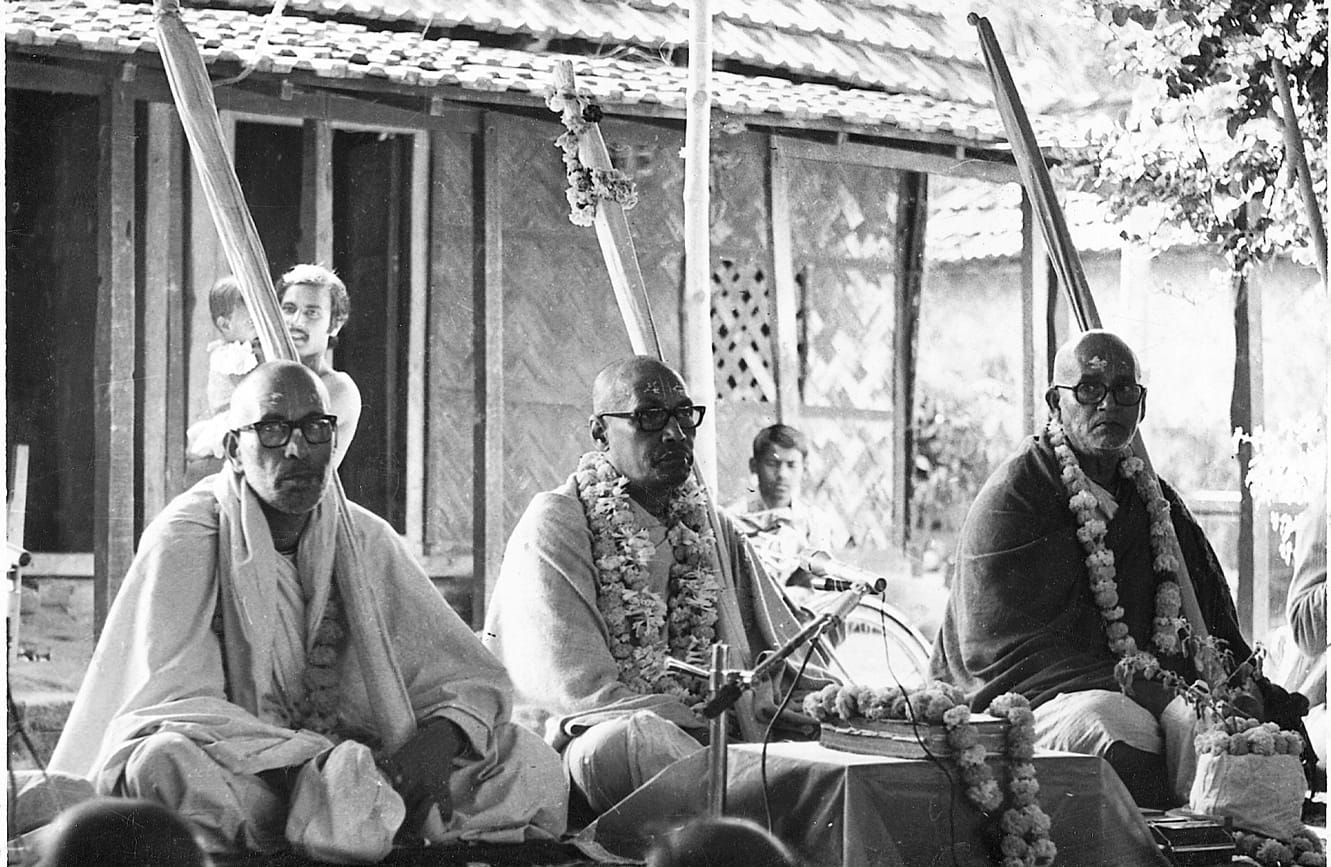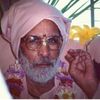Śrīla Gurudeva's Sannyāsa

and Śrī Gaura-janmotsava
Śrī Gauḍīya-patrikā, Year–4 (1952–1953), Issue–2, page 74:
This year, the Śrī Navadvīpa-dhāma Parikramā and Śrī Gaura-janmotsava held by Śrī Gauḍīya Vedānta Samiti was conducted as never before on a scale vast in all regards. As per the previously circulated newsletter, the scheduled days of devotional service (niyama-sevā) were observed in a regulated manner from the 22nd of Phālguna. On the 22nd of Phālguna, parikramā of Śrī Godruma-dvīpa and Madhya-dvīpa was performed, on the 23rd of Phālguna, Śrī Kola-dvīpa and Ṛtudvīpa, on the 24th of Phālguna, Śrī Jahnu-dvīpa and Śrī Modadrumadvīpa, on the 25th of Phālguna, Śrī Rudradvīpa, and on the 26th of Phālguna, Śrī Sīmantadvīpa and Śrī Antaradvīpa. On the 27th of Phālguna, Śrī Gaura-janmotsava and, on the next day, a grand festival for all was successfully held.
Although the Samiti’s founder and chairman, Parivrājakācārya Tridaṇḍisvāmī Śrī Śrīmad Bhakti Prajñāna Keśava Mahārāja was not personally present at the time of parikrama, as per his auspicious wishes, at every holy place that the pilgrims took darśana at, readings and speeches were held and, along all the paths, with exuberant dancing and kīrtana, parikramā was performed following the guidance of Śrīla Prabhupāda’s worshipful painted image (arccā-ālekhya-mūrtti). In some places Tridaṇḍisvāmī Śrīmad Bhakti Prāpaṇa Dāmodara Mahārāja read from various granthas and delivered speeches, in some places Paṇḍita Śrīpāda Rādhānātha Dāsa Adhikārī (current name: Tridaṇḍisvāmī Śrīmad Bhaktivedānta Trivikrama Mahārāja) did so, and in some places Śrīpāda Ananta-Rāma Brahmacārī Bhakti-śāstrījī did the same. Most days, the veteran sannyāsī of the aforementioned Samiti, Tridaṇḍisvāmī Śrīmad Bhakti Kuśala Nārasiṁha Mahārāja, lead the parikramā.
As Śrī Nṛsiṁha-deva Pallī is situated at a great distance from Śrī Devānanda Gauḍīya Maṭha, to alleviate the exhaustion and fatigue of the pilgrims, on the way, on the banks of the Alakānandā, at Śrī Hari-hara Kṣetra, arrangements were made to distribute the deities’ bālya-bhogaprasāda. Similar arrangements were made in Jahnudvīpa as well. During this time, even though there were strong winds and intermittent cloud-cover across Navadvīpa-maṇḍala, due to the expert management of the Samiti, none of the pilgrims had to endure any difficulty.
On the 26th of Phālguna, Monday, on the day of parikramā in Antaradvīpa, following in the wake of Śrīman Mahāprabhu’s vijaya-vigraha, with a great number of pilgrims, the parikramā congregation arrived at Śrīdhāma Māyāpura, at the birthplace of Śrī Gaura. The sight of everyone crossing the Gaṅgā via the ferry ghats was especially enchanting and captivating to the heart. From far away, scores of multicoloured flags and the beautifully decorated palanquin drew the gaze of the onlookers. Compared to other years and other parikramā congregations, this time, the number of Śrī Vedānta Samiti’s pilgrims was so great that everyone was shocked at the sight.
The pilgrims had darśana of Śrī Gaura-janma-sthāna, Śrīvāsa Aṅgana, Śrī Caitanya Maṭha, Jagad-guru Śrīla Prabhupāda’s samādhi, Cā̃nda Kājī’s samādhi, Śrīdhara Aṅgana, Śrī Murāri Gupta’s home and other places and then returned back to Śrī Śrīman Mahāprabhu’s birthplace. There, to alleviate their fatigue and weariness, a profuse amount of bālya-bhoga collected and prepared by Śrī Vedānta Samiti was distributed to everyone.
Every year, at the insistence of the honorable Śrīyuta Anantadeva Brahma and Śrīyuta Bhūdeva Brahma Mahodaya, Śrī Vedānta Samiti holds the adhivāsa-mahotsava (the preliminary festival) on the eve of Śrī Gaura Janmotsava at their residence. Even though they were especially eager to do so this year as well, they are very sad that they could not host the adhivāsa festival there. The hearts of devotees like them are always immersed in the service of Śrī Hari, guru, Vaiṣṇavas. It goes without saying that they would be upset that this annual festival is not happening. Whatever the case, the members of the Samiti have taken note of their anguish, humility, and heartfelt manner and are expressing their special thanks. It is because of a fateful mishap that we cannot hold the festival there this year and delight them. For that we are especially sad.
Wherever Śrī Gauḍīya Vedānta Samiti brought the parikramā to have darśana, all the maṭhas, temples and places of service, the devotees received respectful reception and greetings. For that, the Samiti extends its thanks to everyone.
The parikramā congregation returned to Śrī Devānanda Gauḍīya Maṭha in Kuliyā city on the aforementioned 26th of Phālguna and, after honoring prasāda on the adhivāsa-mahotsava of Śrī Gaura Janmotsava, took rest. The next day, the 27th of Phālguna, was Śrī Śrī Gaura Janmotsava, or fasting for the birth of Śrī Gaura. That day, bathing, the distribution of charity, worship, readings, and everything else commenced from sunrise. Readings from the sacred text of Śrī Caitanya-Bhāgavata were continuous. All the gentlefolk, local and foreign, participated in this function with special eagerness. A matter of special delight is that the kīrtana party from the neighbourhood performed lively kīrtana and dance in the hall in front of Śrīman Mahāprabhu. The Samiti members honored and greeted them suitably and conveyed the wish for them to gain the qualification to perform pure kīrtana under the guidance of immaculate Vaiṣṇavas.
This year, on the day of Śrī Gaura’s birth, Śrī Gauḍīya Patrikā’s three distinguished sevakas accepted tridaṇḍa-sannyāsa. The pilgrims have made their lives a success having had the fortune to witness the ceremony. From doing so they will realize the futility of materialistic life and supremacy of the fourth āśrama.
These days, in attempting to preach the immaculate hari-kīrtana practiced and preached by Śrīla Prabhupāda, some people invoke many types of activities, undertakings, and imitations aimed at sense gratification. The imitation of truth is not truth. Though there is a dance hall in front of the śrī mandira, that is not a place for theatrics. In His pastimes, Śrīman Mahāprabhu infused the hearts of His servants in general with fear of being an actor. Even Śrī Advaita Prabhu himself also displayed the ideal of staying far away from that. Though tāmbula (betel nut) and other fragrant and enjoyable substances are offered to Śrī Bhagavān, mortal entities who have anarthas will remain far away from this sort of indulgent sporting. This is Śrīla Prabhupāda’s ideal and teaching. I will be delighted to see all of us become invigorated and inspired by this ideal.
—Tridaṇḍisvāmī Śrī Bhaktivedānta Nārāyaṇa Mahārāja
